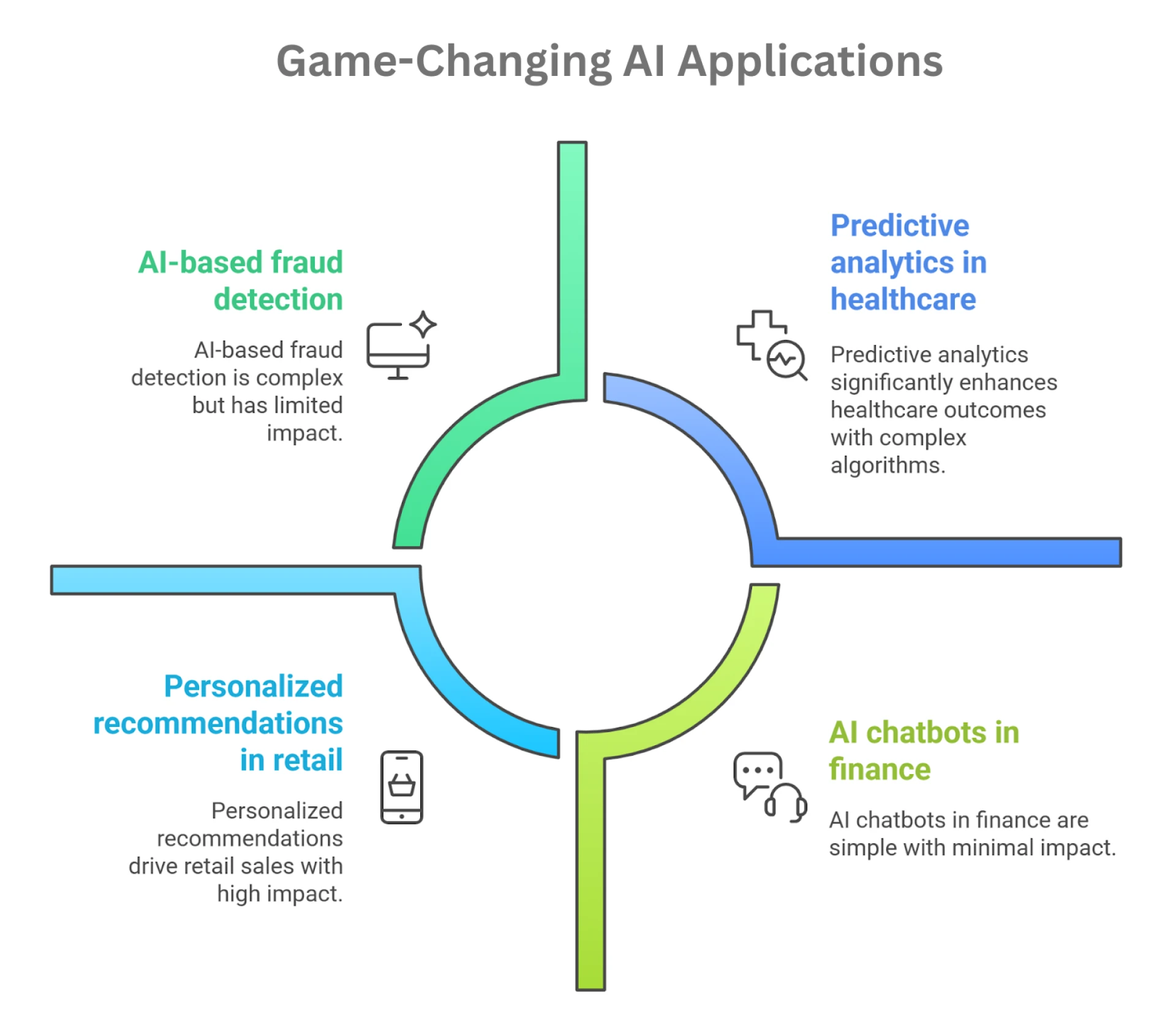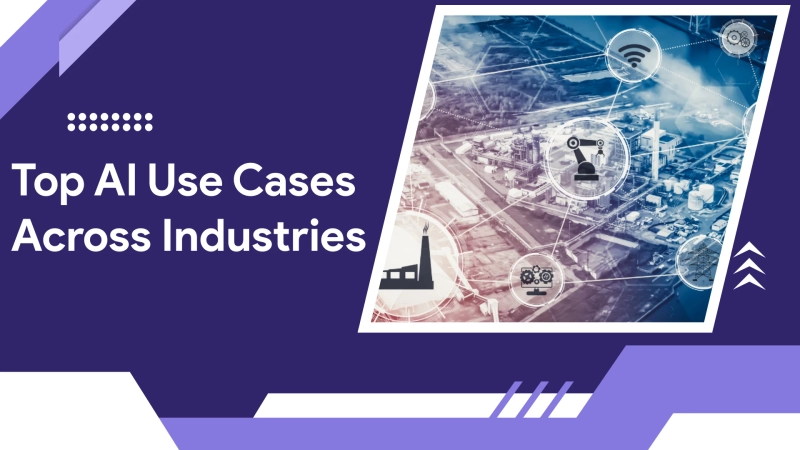Artificial Intelligence is no longer a thing of experimentation, it has already become the foundation of change in all industries around the world. AI has transformed how companies add value to their organizations, whether it is predicting patient outcomes in hospitals or fraud detection in banks. By 2025, the scope of what can be done with AI has grown exponentially, with organizations using it to drive operational efficiency as well as open up entirely new business models.
The advancement is majorly facilitated by the experience of consulting partners who are taking businesses through the maze of AI adoption. The task of consultants is to close the gap between high technology and the practical implementation of AI projects so that the project has a quantifiable effect. Firms investigating the Top AI Consulting Companies are coming to understand the importance of these alliances in driving the change that is taking place across the industry.

Healthcare: AI as a Lifesaver
In healthcare, AI is no longer a thing of experimental labs, it is actively saving lives. Predictive analytics is one of the most significant advances, as it enables physicians to foresee risks of patients before they become severe. Algorithms can track medical history, lifestyle factors, and genetic indicators to predict health conditions (such as heart disease or cancer) before they are otherwise detected. This early intervention can spell the difference between invasive and expensive treatment and manageable care plans.
Medical imaging is also being transformed with precision by I. Currently, computer vision systems are sufficient enough to identify anomalies in scans better than human radiologists. To eliminate the human factor and accelerate diagnosis, hospitals and diagnostic centers are switching to these solutions. Behind the curtains, consulting companies assist healthcare providers in incorporating these solutions into processes and make them compliant with stringent regulations, such as HIPAA, allowing AI to be safe and effective for patients.
Finance: AI as the Guardian of Trust
Financial services have been using AI to protect against fraud and to drive personalization with customers. By 2025, AI-based fraud detection systems will be more sophisticated, with real-time anomaly detection to warn of suspicious activity in milliseconds. In contrast to older rule-based systems, modern AI is dynamic and aligns itself with changes in fraud patterns, safeguarding banks and consumers against financial loss.
In the meantime, AI is also changing customer service in the financial industry. Artificial intelligence chatbots and virtual assistants are available at all times to walk clients through loans, investment guidance, or account inquiries. Not only are these not scripted bots, but they utilize advanced AI agent development that enables them to manage complex interactions and escalate when necessary. In the case of banks, this will mean increased customer satisfaction and lower operational costs, a win-win situation.
Retail: AI as the Personal Shopper
Retail is now one of the most active areas of AI innovation. AI systems can now provide personalized recommendations with incredible accuracy, which has become an expectation of the consumer. With the help of AI, retailers can understand the browsing habits, purchase history, and even real-time interactions to present the products that feel personalized to each shopper. The outcome is not only increased sales but also increased brand loyalty as the customers feel understood on a deeper level.
In addition to personalization, AI is transforming the inventory management process. Predictive algorithms assist retailers in making more accurate forecasts and decreasing overstocking and stockouts. The supply chains are also taking advantage of real-time optimization with the help of AI, so that products arrive at the customers within a shorter time and at reduced costs. Retail consulting firms are key players in this process, assisting companies to make technology match the expectations of customers and to ensure that systems can be used across multiple channels and geographies.
Manufacturing: AI as the Efficiency Engine
Manufacturing is in a new phase of AI-powered automation and predictive maintenance. One of the most effective applications is applying machine learning in predicting equipment failures in advance. AI could be used to identify wear and tear patterns by analyzing sensor data, which enables companies to schedule maintenance before it is too late and incur expensive downtimes. Not only does this save millions, but it also increases the life of machinery.
Real-time production line optimization is also being carried out using I. Algorithms process the data on operations and optimize the processes to minimize waste, energy consumption, and product quality. Factories are being made more intelligent and sustainable through the capability of AI to constantly learn and improve. A skilled consulting partner also ensures that these innovations fit within legacy systems without creating disruption and instead have a maximum impact.
Cross-Industry Use Cases
While each industry has unique challenges, several AI use cases cut across sectors. These applications are reshaping multiple industries simultaneously:
- Natural Language Processing: Powering chatbots, customer support, and compliance checks.
- Computer Vision: Enhancing product inspections, security, and medical imaging.
- Predictive Analytics: Driving better demand forecasts, risk assessments, and patient outcomes.
- Robotic Process Automation (RPA): Automating repetitive, rules-based tasks across industries.
- Generative AI: Creating content, product designs, and simulations to accelerate innovation.
These cross-industry innovations highlight AI’s versatility, showing how consulting partners customize solutions to fit different operational contexts.
Role of AI Consulting Partners
In any industry, the successful adoption of AI needs more than just algorithms. Companies require advice on strategy, data preparedness, system integration, and change management. This is where consulting firms come in by ensuring that they give a roadmap that balances technical innovation and business results. Their task is to make sure that AI solutions are not only potent but also effective in the long term.
In some instances, firms also opt to hire AI developers with skills to supplement consulting skills, especially when they require in-house assistance with continued innovation. The right partner will assist in achieving this balance, providing strategic management and technical implementation skills to ensure AI projects can scale.
Building Custom AI Solutions
With the maturation of AI, a lot of companies have come to understand that their problems require more than off-the-shelf tools. That is why an increasing number of organizations collaborate with an AI software development company to create custom solutions. These companies have a mixture of technical engineering capabilities and specific knowledge, enabling firms to create tools that fit their particular objectives instead of them having to adapt to generic products.
Custom development also allows businesses to own the intellectual property and be able to advance their solutions as technology progresses. Organizations can develop platforms that support their AI needs today and in the future with the proper consulting and development combination.
Final Thoughts
In 2025, AI is no longer a choice; it is the basis of businesses that will want to stay in the market. Whether it is predictive analytics in healthcare, fraud detection in finance, personalization in retail, or automation in manufacturing, AI is transforming industries. However, it is not enough to use technology only. The true differentiator is the ability to make the right selection of partners who can convert the potential of AI into quantifiable business outcomes.
Whether you are benchmarking the Top AI Consulting Companies or exploring niche development firms, the idea should always be on how to align AI with your business goals. With a thoughtful approach to consulting expertise, a focus on bespoke solutions, and a collaborative mindset, your business can not only embrace AI but also flourish in the era of intelligence.



